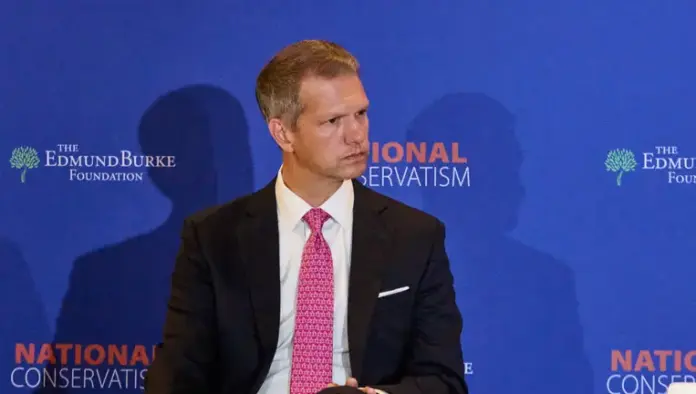A member of the United States Congress, Riley Moore, has called on President Bola Ahmed Tinubu to strengthen and deepen Nigeria’s relationship with the United States, even as tensions remain over Washington’s decision to label Nigeria as a “country of particular concern” on issues related to human rights and religious freedom.
Rep. Moore, who has been one of the most vocal American lawmakers on Nigerian affairs, has consistently criticised the Nigerian government’s handling of alleged religious and human rights abuses. He has also been at the forefront of the push in Washington for stronger measures, including sanctions and possible military action, against Nigerian officials accused of violating human rights.
Speaking recently in Washington, Moore said that President Tinubu now has a “unique opportunity” to rebuild confidence and improve diplomatic relations between both countries. “We want President Tinubu to deepen and strengthen the relationship with the United States and, more importantly, to do the right thing,” he said.
Nigeria’s inclusion on the US list of “Countries of Particular Concern” (CPC) has been controversial. The designation, which was first introduced under the International Religious Freedom Act of 1998, is used by the US State Department to identify countries that engage in or tolerate severe violations of religious freedom.
The United States had briefly designated Nigeria as a CPC in 2020 during the administration of former President Donald Trump. However, the decision was reversed by President Joe Biden’s administration in 2021, drawing criticism from religious freedom advocates and some members of the US Congress, including Rep. Moore.
Recently, Moore and other US lawmakers renewed pressure on the State Department to restore Nigeria’s designation, citing reports of attacks on Christian and Muslim communities, farmer-herder conflicts, and the government’s alleged failure to protect vulnerable populations in parts of the country.
President Tinubu, who came into office in May 2023, has rejected claims that Nigeria is guilty of religious persecution. In a statement during an international event in September this year, he said, “There’s no religious persecution in Nigeria.”
According to the President, Nigeria’s challenges are rooted not in religion but in broader issues such as poverty, unemployment, and insecurity. He maintained that his administration is working to rebuild the economy, create jobs, and promote national unity.
Tinubu has also repeatedly stated that Nigeria remains committed to democracy and human rights. His administration has called for greater international support rather than sanctions, arguing that punitive measures could worsen the country’s economic difficulties.
Relations between Nigeria and the United States have long been important, covering trade, security, education, and public health. The US is one of Nigeria’s largest trading partners, and Nigeria remains a key player in regional security in West Africa, especially in the fight against terrorism and violent extremism.
However, recent disagreements over governance, human rights, and security operations have tested the relationship. Washington has expressed concern about reports of excessive use of force by security agencies, restrictions on press freedom, and treatment of protesters in Nigeria.
On the other hand, Nigerian officials have urged the US to respect the country’s sovereignty and understand the complexity of its internal security challenges. They argue that issues such as the Boko Haram insurgency, banditry, and communal violence cannot be simplified as religious persecution.
Diplomatic experts believe President Tinubu has an opportunity to reset relations with Washington by promoting transparency, accountability, and respect for human rights at home. They also suggest that Nigeria could benefit from renewed US partnerships in technology, energy, and education if trust is restored.
Dr. Chika Eze, a foreign affairs analyst based in Abuja, said, “The US wants to see real progress in governance and human rights in Nigeria. If Tinubu can demonstrate commitment to reforms, it will strengthen ties and attract more foreign investment.”
Despite disagreements, both countries share many mutual interests. The US has supported Nigeria in health initiatives such as the fight against HIV/AIDS through the PEPFAR program, and in counterterrorism efforts in the Lake Chad region. Nigeria also remains a vital partner in promoting stability across Africa.
For many Nigerians, especially those affected by insecurity, the hope is that both nations can work together to improve lives, promote peace, and strengthen democracy.
